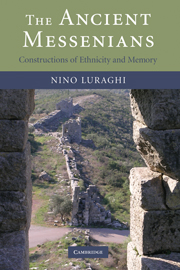Book contents
- Frontmatter
- Contents
- Acknowledgments
- List of abbreviations
- List of illustrations
- Chapter 1 Introduction
- Chapter 2 Delimiting the Messenians
- Chapter 3 The return of the Heraclids and the mythical birth of Messenia
- Chapter 4 The conquest of Messenia through the ages
- Chapter 5 Messenia from the Dark Ages to the Peloponnesian War
- Chapter 6 The Western Messenians
- Chapter 7 The earthquake and the revolt: from Ithome to Naupaktos
- Chapter 8 The liberation of Messene
- Chapter 9 Being Messenian from Philip to Augustus
- Chapter 10 Messenians in the Empire
- Chapter 11 Conclusions
- Bibliography
- Index locorum
- Index of inscriptions
- Archaeological sites
- General index
Chapter 9 - Being Messenian from Philip to Augustus
Published online by Cambridge University Press: 22 September 2009
- Frontmatter
- Contents
- Acknowledgments
- List of abbreviations
- List of illustrations
- Chapter 1 Introduction
- Chapter 2 Delimiting the Messenians
- Chapter 3 The return of the Heraclids and the mythical birth of Messenia
- Chapter 4 The conquest of Messenia through the ages
- Chapter 5 Messenia from the Dark Ages to the Peloponnesian War
- Chapter 6 The Western Messenians
- Chapter 7 The earthquake and the revolt: from Ithome to Naupaktos
- Chapter 8 The liberation of Messene
- Chapter 9 Being Messenian from Philip to Augustus
- Chapter 10 Messenians in the Empire
- Chapter 11 Conclusions
- Bibliography
- Index locorum
- Index of inscriptions
- Archaeological sites
- General index
Summary
The birth of a free Messenian polity in 369 bc did not put an end to the Messenian anomaly: it rather added new facets to it. Latecomers that they were, the Messenians were destined to be haunted for the rest of their existence by their problematic absence from the shared record of the Greek past. Especially during the third century, they seem to have been quite active in their efforts to obviate this situation, as witnessed by the efflorescence of works on the Messenian Wars in this period (above, pp. 83–8). In other ways, though, it was the little history they had, fragmentary as it was, that created problems for the new Messenians. Unlike other new polities that emerged around the same time, such as Triphylia and Pisatis, Messene had existed in Panhellenic consciousness as the lost fatherland of the Messenians for almost a century before it became a political reality. Without underestimating the impact of power relations in the Peloponnese and beyond, this widespread consciousness certainly goes a long way in explaining why the legitimacy of the new political entity found acceptance so quickly. However, the preexistence of an imaginary Messene was something the Messenians now had to come to terms with. The accepted features of what we could call the Messenian prehistory set a framework, especially in geographic terms, for the creation of the new Messene.
- Type
- Chapter
- Information
- The Ancient MesseniansConstructions of Ethnicity and Memory, pp. 249 - 291Publisher: Cambridge University PressPrint publication year: 2008



